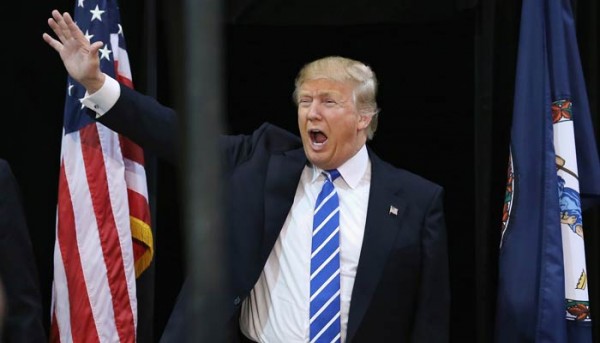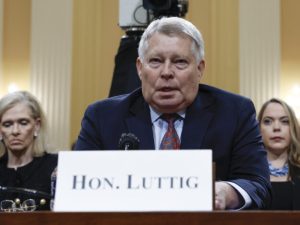Could Colorado keep Trump off 2024 ballot under Section 3 of U.S. Constitution’s 14th Amendment?

A growing chorus of conservative scholars and former judges, including J. Michael Luttig – who helped scuttle elements of the alleged Jan. 6 coup attempt from his home in Vail – are making a compelling case former President Donald Trump is constitutionally barred from appearing on the 2024 ballot.
Those arguments from two law professors active in the conservative Federalist Society and supported last week in the Atlantic by Luttig and Harvard University Professor Emeritus Laurence Tribe hinge on Section 3 of the Fourteenth Amendment to the U.S. Constitution.
The so-called disqualification clause was enacted just after the Civil War in 1868 to keep insurrectionists out of office. Luttig and others argue that secretaries of state around the country have an obligation to not certify Trump for the 2024 ballot in the likely event the runaway presidential frontrunner is nominated by the Republican Party in July – a move that would lead to legal challenges that should then be decided by the U.S. Supreme Court, they say.

Appearing after Luttig and Tribe on MSNBC on Aug. 19, Colorado Secretary of State Jena Griswold was immediately asked about the push to prohibit Trump from running for a second term in 2024 — “starting off with the tough questions,” as she put it:
“First and foremost, there is a lot of steps that have to happen before we even get to the question of ballot certification,” Griswold said. “In Colorado, no candidate has even delivered eligible paperwork yet. Of course, there’s fees. The parties have to say the person is a bona fide candidate. And, of course, one of the big reasons we’re here to talk this morning is that there’s all this litigation happening around the country. So, I would say it is premature for me as secretary of state to comment, but this topic is more and more in the news. It’s a novel situation, as all of this has been, given the former president tried to steal the 2020 election and his assault on democracy has not stopped.”
Trump was arrested and booked in Fulton County, Ga., on Thursday for racketeering and other charges for his attempts to overturn that state’s 2020 victory for President Joe Biden. Trump also faces federal charge for his lead role in trying to illegally keep Biden out of office, culminating in the deadly Jan. 6, 2021 U.S. Capitol riot.
Two nonprofit groups — Citizens for Responsibility and Ethics in Washington (CREW) and Free Speech for People – are citing Section 3 in challenging Trump being on the 2024 ballot in states around the nation, primarily appearing to focus on the swing states likely to determine the race. Some analysts believe state legislatures may need to clarify, if not codify into state law, the role of state election officials in determining a candidate’s eligibility for appearing on the ballot.
Asked if the Colorado Legislature needs to act this coming session in January to clarify and enable that determination in statute, so that if the SOS decides a candidate is disqualified under Section 3, Griswold can then act to keep them off the ballot, SOS spokesperson Jack Todd on Wednesday replied by email: “As the secretary noted on [Aug. 19], it is premature to say anything more at this time regarding the content of Colorado’s ballot in 2024. Neither the department nor the secretary have further comment at this time.”
Section 3 of the Fourteenth Amendment to the U.S. Constitution, ratified in 1868, reads:
“No person shall be a Senator or Representative in Congress, or elector of President and Vice-President, or hold any office, civil or military, under the United States, or under any State, who, having previously taken an oath, as a member of Congress, or as an officer of the United States, or as a member of any State legislature, or as an executive or judicial officer of any State, to support the Constitution of the United States, shall have engaged in insurrection or rebellion against the same, or given aid or comfort to the enemies thereof. But Congress may by a vote of two-thirds of each House, remove such disability.”
The scholars calling for Trump to be blocked from running under Section 3 say the Constitution requires it, Congress does not need to act – unless it’s to overrule such a prohibition by a two-thirds vote – and that a conviction in either of Trump’s two 2020 election cases is not needed. The prevailing school of thought is it should occur in swing states such as Michigan, where Secretary of State Jocelyn Benson has been conferring with her counterparts in swing states such as Pennsylvania, Nevada and Georgia.
Professor Robert Preuhs, chair of the Metropolitan State University of Denver Political Science Department, disagrees.

“If you’re going to see it, you’re actually going to probably see it in liberal states that don’t matter, because there’s still a political decision in terms of whether this is something they want to do or not,” Preuhs said. “Even though the argument is that it should be self-enacting and … there doesn’t need to be a conviction for insurrection or aiding and abetting, I think that Secretary Griswold’s response – and she is by no means a Trump fan — probably reflects the hesitation in terms of … if Trump meets all the other criteria to make the ballot, I would imagine that she would prefer not to have to make that decision.”
Luttig and others say a challenge to Trump’s qualification under Section 3 need not come from a secretary of state — underscored Thursday by a Florida tax attorney filing a challenge — but regardless, Preuhs says the ultimate decision by election officials to bar Trump from the ballot under Section 3 would carry significant risks.
“The problem is we actually don’t know what that result will be from the civil unrest side, or what the result of the elections will be,” Preuhs said. “Without a conviction in the public’s mind, and even with a conviction in some of the public’s mind, it’s going to come off as a maneuver to remove their preferred candidate from the ballot regardless of the wording of the Fourteenth Amendment, Section 3. That’s kind of the political reality all of these secretaries of state and others are going to have to deal with.”
Wednesday night at a debate in Milwaukee, the majority of the eight potential Republican nominees for president in 2024 indicated they would support frontrunner Trump, who did not attend, even if he’s convicted. In an interview with former FOX News star Tucker Carlson, aired on the social media site X during the debate, Trump was asked if he expects open conflict in the streets.

“I don’t know,” Trump replied, comparing the current mood to Jan. 6. “I can say this: There’s a level of passion that I’ve never seen. There’s a level of hatred that I’ve never seen. And that’s probably a bad combination. Jan. 6 was a very interesting day because they don’t report it properly. People in that crowd said it was the most beautiful day they ever experienced. There was love and unity. I have never seen such spirit and such passion and such love. And I’ve also never seen, simultaneously and from the same people, such hatred at what they’ve done to our country.” Five people died and 140 officers were injured as a result of the Jan. 6, 2021 attack.
Preuhs says Democratic secretaries of state such as Griswold also know their Republican counterparts are unlikely to abandon their party’s presidential nominee and that it doesn’t look great if only Democrats move to block Trump from the ballot using a Civil War-era tool.
“There was a Civil War, and that was an obvious point of insurrection, and individuals that held office for our enemy,” Preuhs said. “Even then, when it seemed so cut and dry and we did enter in a period of reconstruction, which essentially wiped out the participation of most southern Confederates from government for a short period of time, even then the politics let folks back.”
Even Democratic secretaries of state, in largely blue states like Colorado where Trump lost by 13 points, won’t want to have to make that Section 3 call, Preuhs concludes.
“All of them are hoping that either a conviction would allow for them to solidify something like that, make it clear to the public, or for the unlikely scenario that somehow Trump doesn’t win the nomination,” Preuhs said. “It could be ugly, of course, if Trump wins, and we don’t enforce the law and we don’t have clarity going forward from the Supreme Court decision, but it’s not clear to me that the Supreme Court would necessarily side with those secretaries of state that are removing him from ballot either, given the makeup of the court and given all those other reasons that you can find ways to say, well, it doesn’t quite meet that threshold [for removal].”


Latest posts by David O. Williams (see all)
- Democratization or ruination? A deep dive on impacts of multi-resort ski passes on ski towns - February 5, 2025
- Western Rail Coalition looks to revive passenger rail service on long-dormant line connecting Colorado mountain towns - January 22, 2025
- Colorado ski town looks to dig deep, diversify energy sources as climate change threat looms - January 10, 2025

You must be logged in to post a comment Login